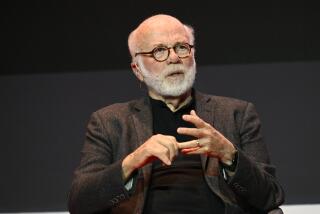Political Appointees Not NEAâs Problem
Art critic Christopher Knight, in a half-page of panting hyperbole (Iâm avoiding honest Anglo-Saxon in a family newspaper) that must have used a treeâs worth of newsprint, brandishes a proclamation Robespierre would have put better, and shorter: âArtists of America, rise up! You have nothing to lose but your grants. Off with their heads!â
To clarify Knightâs hyperventilated prose, heâs convinced the White House is turning the National Endowment for the Arts into a Soviet-style Ministry of Culture by appointing to its advisory council people who pollute the artistic integrity of the NEAâs program by secretly denying grants to honest artists struggling to be free.
These individuals, he fears, are (ugh) political appointees, âcreatingâ (to give you a sample of Knightâs prose) âthe specter of an agency operating as artistic handmaiden to the ebb and flow of political power. Thatâs whatâs happening now. A Ministry of Culture is quietly being born. It is a full-scale debacle.â How about that?
Let me try to put all of this in a more realistic perspective, speaking from some experience. All my adult life, Iâve made my living in three of the arts, and played as a passionate amateur in two more.
I served a term on the National Council on the Arts and headed two major groups funded by it, the American Film Institute and the Center Theatre Group, resigning those chairmanships to serve as co-chairman on the Presidential Task Force on the Arts and Humanities.
After several months of hearings, we submitted a report endorsing the functions of the NEA and National Endowment for the Humanities, as well as the independent use of federal tax monies to fund their activities.
Iâve spent weeks of my life traveling the country with my begging bowl seeking money for the arts from state and federal taxes, as well as private and corporate pocketbooks. Believe me, I know the ground, the players and the game.
Knight is appalled that the National Council denied grants (less than 2%) submitted for approval by the peer panels and the NEA bureaucracy, including two âsexually explicitâ projects (his words, not mine). If a 1.7% rejection rate strikes Knight as Draconian, consider the thousands of grant applications turned down by both peer panels and bureaucrats without ever reaching the council table.
If sexual explicitness arouses his special passion, I point out that dozens more such projects were likely among those rejected earlier by the peer panels. The granting or denial of public funds to pay for them hardly seems worth a half page in The Times. The Republic, I think, will survive.
What may not survive is the NEA. If enough constituents of enough congressmen feel their tax money is spent irresponsibly, Congress will deny the relevant funding; thatâs the simple reality. The First Amendment guarantees wide protection of public expressions, it does not guarantee public money to pay for it.
Knight feels NEA choices are being made by âpolitical appointeesâ to the National Council. Does he imagine the hiring of NEA bureaucrats and peer panelists is somehow free of political bias? Why should he think artists, professional or would-be, are âdisinterestedâ participants in the grant-making process?
He is sure the guardians of cultural freedom are corrupted and appoints himself their judge. Who watches the watchers then, Mr. Knight?
More to Read
The biggest entertainment stories
Get our big stories about Hollywood, film, television, music, arts, culture and more right in your inbox as soon as they publish.
You may occasionally receive promotional content from the Los Angeles Times.










